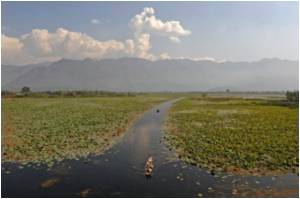
More over, it has also kicked the bellies of a number of fishermen, who are dependant on the lake's resources.
Experts have expressed serious concern over this environmental crisis.
"Dal Lake has shrunk to less than half its original size in just 30 years. Poor sanitation systems, shortsighted city planning, and the encroachment of thousands of people are destroying the region's waters", says Majeed Kak, a scientist at the Islamic University of Science and Technology in Srinagar.
Disposal of raw sewage from Srinagar's million-plus inhabitants, which mostly contain polyethylene bags, soda cans, and dead animals, is considered to be the chief reason behind the problem. Poor planning of the road systems has also added to the woes.
"If the government had built the roads around the perimeter of the lake rather than straight through it, then it would have been much harder for people to encroach on the lake," says Azim Tuman, a houseboat owner.
Advertisement
"The money allocated for de-weeding machines to remove the excess weeds from the lake and water-sewage treatment plants has been squandered or is totally ineffective," says Kak.
Advertisement









